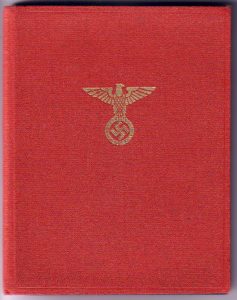 (Left, NSDAP membership book.)
(Left, NSDAP membership book.)
The NSDAP, he [Hitler] claimed, had been established on ‘the basis of an extreme racial outlook and rejects any form of parliamentarism’, including its present-day incarnation. It was intended to be quite different from all other ‘so-called national movements’, and so constructed that it would best serve to wage ‘the battle for the crushing of the Jewish-international domination of our people’. The NSDAP was also a ‘social or rather a socialist party’, whose statutes laid down ‘that the seat of its leadership was Munich and must remain Munich, now and for ever’.
This programme, Hitler continued, had been agreed as ‘immutable and inviolable in front of an audience of a thousand people, and invoked as a granite foundation in more than a hundred mass meetings’. Now, Hitler claimed, these principles had been violated by plans to merge with another party, by the agreement at Zeitz to move the headquarters to Berlin and by the prospect that they would be abjured in favour of the programme of Otto Dickel, which he condemned as a ‘meaningless, spongy [and] stretchable entity’. Specifically, Hitler objected to Dickel’s belief that Britain was emerging from under the thumb of the Jews and to his admiration for the Jew Walther Rathenau. He was interested in propaganda, not organization, and the power of ideas, not bureaucratic power…
Hitler averred that he made these demands ‘not because I crave power’ but because he was convinced that ‘without an iron leadership’ the party would soon degenerate from a National Socialist Workers Party into a mere ‘Occidental League’. Hitler had originally wanted to control the message rather than the party, but he now realized that he could not do the former without ensuring the latter.
It is not quite clear whether Hitler resigned with the intent of forcing the leadership’s hand, or whether he left in despair and decided to lay down the law only after attempts to win him back showed the underlying strength of his position. Even then, his demands were more modest than they sounded, being subject (as the law required) to membership vote. The ‘dictatorial powers’ were not requested for the running of the party in general but limited to the sphere that Hitler was primarily concerned about, namely the re-establishment and maintenance of ideological coherence. This is what underlay his demand to purge deviators, to oversee the absorption of other groups and the retention of Munich as an ideological ‘Rome’ or ‘Mecca’. The outcome, in any case, was the same. Hitler triumphed all along the line. Drexler caved in…
Hitler’s struggle with Drexler is common to most emerging political movements: the clash between the need for growth and the maintenance of ideological purity, which was the side which he took with such vigour. In July 1921, Hitler won his first political battle. He had become a politician. Whether Hitler had sought leadership or had leadership thrust upon him, it was clear that he now was increasingly not merely the de facto but the formal chief of the NSDAP. If he had once seen himself as a mere ‘drummer’ of the movement for the new Germany, he now aspired to be its leader.